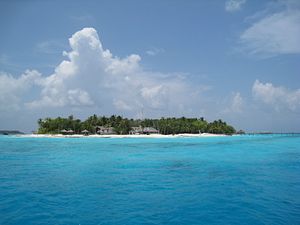The Maldives’ recent constitutional amendment was perhaps the fastest to clear the parliament in recent history. With no debate, no consultation, and no time for legislators to study the draft, the Majlis, the Maldivian parliament, passed a landmark amendment authorizing foreign ownership of land thereby raising questions regarding the intents of the ruling Progressive Party of the Maldives (PPM). It took the parliament under 24 hours to effect a major change in the constitution, allowing foreigners to acquire land on a freehold basis on any of the 1,200 islands that comprise the Maldives.
“There has been no public debate, no consultation and the amendment passed so quickly that everyone is still in shock. It was an unprecedented move and people are still confused,” says Zaheena Rasheed, editor of Minivan News, a prominent news portal in the Maldives.
The amendment, in a radical departure from the past, allows foreign nationals to buy land on a freehold basis. Many legislators critical of the amendment says that it is aimed at giving China a foothold in the Indian ocean, disturbing the balance of power between New Delhi and Beijing in the region.
The new law allows foreigners to invest up to $1 billion in an area on a freehold basis. 70 of the archipelagic state’s 84 lawmakers voted in favor of the bill and just 14 against. The opposition party, led by the now-imprisoned former President Mohamed Nasheed, also supported the amendment.
Those opposing the new legislation don’t mince their words, however.
“The biggest priority of Maldivian foreign policy should be stability in the Indian Ocean. With this amendment, Maldives is facilitating a more robust Chinese presence in the Indian Ocean,” says Eva Abdullah, a legislator from the MDP, who cast one of the few dissenting votes against the amendment.
Speaking to The Diplomat, the young lawmaker notes that “for now, what I fear is that we are paving the way for the establishment of Chinese bases in the Maldives and making the country a frontline state between India and China, thereby disturbing the current balance of power in the Indian Ccean. We cannot ignore the increasing rivalry between India and China.”
In a scathing attack on the ruling party, led by President Abdulla Yameen, Abdullah says that the amendment would negate the freedom the island nation won from the British around fifty years ago.
“This will make the country a Chinese colony,” asserts the lawmaker.
Warning the PPM regime for disturbing the status quo in the region, she says that “India is a neighbour. We are not part of the South China Sea and we should be always be mindful of this reality.”
However, Yameen, in an address to the nation on Thursday, said that the amendment would not affect security in the Indian Ocean nor compromise the sovereignty of the nation.
“The Maldivian government has given assurances to the Indian government and our neighboring countries as well to keep the Indian Ocean a demilitarised zone,” argued Yameen.
Indian analysts, however, don’t buy the Maldivian leader’s argument.
“The constitution has been amended for the benefit of the Chinese,” emphasizes Anand Kumar, an analyst based at the New Delhi-based Institute for Defense Studies and Analyses (IDSA). “It is only China which has capacity to acquire 70 percent of the land,” he adds.
He says that “ever since China lost political capital in Sri Lanka after the coming of the new regime, Beijing has lost interest in Colombo and is looking at the Maldives as an alternative option.”
There has been a discernible shift in the Maldives’ foreign policy ever since Yameen came to power last year. Chinese President Xi Jingping was the first leader to visit Male after the inauguration of the new government. He was also the first Chinese head of state to visit the island nation. During that visit, the Maldives agreed to become “a partner in China’s maritime silk route.” Besides that, China is also investing heavily in infrastructure projects in the Maldives.
Interestingly, in 2012, Yameen’s party was responsible for scrapping a $500 million contract for an Indian company which was developing an airport near the capital, calling the deal “a bad deal.” The PPM then described the contract, approved by the former president, Mohamed Nasheed, as a selling out of the sovereignty of the nation.
Three years down the line, this same party has brought about a landmark amendment in the constitution allowing foreign ownership of land.
The former authoritarian president, Maumoon Abdul Gayoom, who happens to be Yameen’s uncle, also cautioned the current Maldivian leadership against rushing a change. In a tweet, he said that “I have appealed to (sic) president to seek public opinion on proposed constitutional amendment and land ownership before ratification.”
This development in the Indian Ocean is a matter of concern for New Delhi. The Maldives has always been part of India’s sphere of influence and anything that will lead to an expanded Chinese presence there is a challenge to New Delhi’s superiority in its own backyard.
































